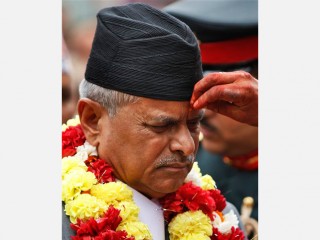
Ram Baran biography
Date of birth : 1948-02-04
Date of death : -
Birthplace : Sapahi, Nepal
Nationality : Nepalese
Category : Politics
Last modified : 2010-07-22
Credited as : Political leader, President of Nepal, physicist
1 votes so far
Yadav was the Minister of State for Health in the 1991-1994 Nepali Congress government. He was elected to the House of Representatives in the 1999 election as a candidate of the Nepali Congress. After that election, he became Minister of Health.
Ram Baran Yadav was elected Nepal's first president in July of 2008. A physician by training, he became a full-time politician (Nepali Congress Party) after his election to parliament in 1991. Although the position of president was mainly ceremonial in nature, even nominally leading the world's youngest republic presented challenges.
Yadav was born into a farming family of the Madhesi ethnic community in the southern village of Sapahi, Nepal. His official birth date was February 4, 1948, but according to Phanindra Dahal and Zhang Jianhua of China View, he maintained that he was three years older than that. Although he became interested in politics while studying medicine at the Calcutta Medical College and the Post Graduate Institute of Medical Education and Research (both in India), he pursued a career as a physician in southern Nepal for many years.
Long a member of the Nepali Congress Party (NC), Yadav became a full-time politician with his election to parliament in 1991. He won a second bid in 1999, and served twice as health minister during his terms. Against the backdrop of Yadav's burgeoning political career, it is important to note that Nepal was in turmoil caused by a ten-year communist insurgency that left more than 13,000 dead. The peace process began in earnest in 2006, when the rebels put down their arms and returned to mainstream politics as the Communist Party of Nepal (Maoist).
In April of 2008, Yadav was elected to the newly-formed Constituent Assembly (CA), the governing body that dissolved Nepal's 240-year-old monarchy and orchestrated the country's debut as the world's youngest democratic republic. The Maoists had won the majority of CA seats in the April election, with the NC coming in second, but the presidential elections were closely contested, resulting in a runoff election in July. Yadav prevailed, winning 308 of the CA's possible 594 votes (eight assembly members were absent). Thus, he became the very first president of Nepal.
Although the new president's role was primarily ceremonial, there were plenty of challenges at hand. One of the most difficult of those would be rallying longtime political enemies to oversee the drafting of a new Constitution. Another was Nepal's immense poverty. Nonetheless, the former doctor appeared hopeful that his homeland would thrive under democracy. "The politics of consensus can only make our people rich and happy," he told Dahal and Jianhua. "If we unite and make our efforts for developing our small country by utilizing the natural resources and beauty of our country, we can be a rich country soon."
















